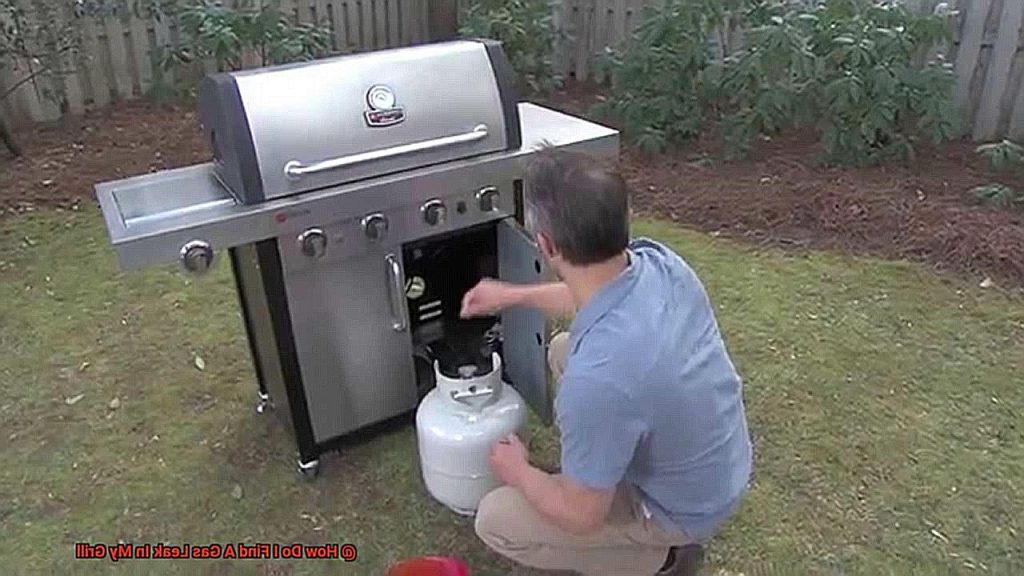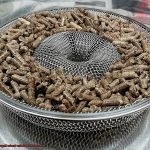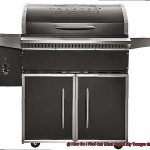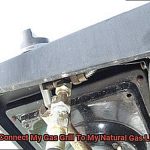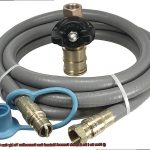Summertime is all about firing up the grill and cooking up a storm. But what happens when you suspect a gas leak in your trusty grill? Not only can it put a damper on your backyard barbecue, but it can also be downright dangerous. That’s why it’s crucial to know how to detect and fix any gas leaks that may occur.
- The first step is always prevention – turning off the gas supply and checking for leaks before using the grill. But what if you’re already mid-cookout and notice something amiss? Fear not, we’ve got your back with some helpful tips and tricks to quickly and safely detect any gas leaks in your grill.
- Gas leaks can happen in various places – from the tank, hose, or valves – so it’s important to know what to look for. You might hear a hissing sound, smell gas, or even see bubbles forming where the gas is escaping. It’s essential to act fast if you suspect a leak, but don’t panic. We’ll guide you through the process of locating the source of the leak and fixing it.
In this article, we’ll outline everything you need to know about detecting a gas leak in your grill. From safety tips to performing a soap bubble test on hoses and connections, we’ve got all bases covered. So grab your favorite grilling tools and let’s get started on keeping your cookout safe and worry-free.
Contents
What Is a Gas Leak?
Gas leaks are a dangerous and potentially catastrophic occurrence that can happen when gas escapes from its intended containment, such as a gas line, tank, or appliance. In particular, gas leaks in grills can be especially hazardous if left undetected, as they can lead to fire or even explosion.
Several factors can contribute to gas leaks, such as damage to the gas line or valve, improper installation of the gas grill, or simply wear and tear over time. To prevent potential gas leaks, it is crucial to regularly inspect your grill for any signs of damage or wear and tear.
One of the most common indicators of a gas leak is the smell of gas. Gas companies add mercaptan to natural gas and propane, giving them a distinct odor so that leaks can be detected more easily. If you notice the smell of gas near your grill, you must take immediate action and turn off its fuel source.
Other signs of a gas leak include hissing or whistling sounds coming from the grill, bubbles forming in soapy water applied to the fuel line connections, or a yellow flame instead of a blue one. These warning signs should not be ignored and must be addressed promptly to prevent any potential danger.
The potential dangers associated with a gas leak are significant and should never be taken lightly. Gas leaks can cause property damage and personal injury due to fires or explosions. Therefore, it is crucial to take immediate action if you suspect there is a gas leak in your grill.
To check for gas leaks in your grill, you can give it a thorough visual inspection for any cracks, holes, or other damage that could be causing the leak. Alternatively, you can use a solution of equal parts water and dish soap to create a soapy water mixture and apply it to all of the gas connections and hoses on your grill. If there is a leak, the soapy water will start to bubble where the gas is escaping.
Another way to check for gas leaks is by using a gas leak detector, which can be purchased at most hardware stores. Follow the instructions on the detector carefully, placing it near the gas connections and hoses on your grill. If there is a leak, the detector will sound an alarm indicating where the leak is coming from.
Why It’s Important to Check for Gas Leaks in Your Grill
When it comes to outdoor cooking, gas grills are a popular choice for their convenience, ease of use and ability to produce mouth-watering meals with minimal effort. However, it’s important to remember that gas leaks can pose a serious safety hazard when using a gas grill. Regularly checking for gas leaks is crucial in ensuring that your grill is operating safely.
Safety First: The Risk of Fire
Gas leaks in your grill can be a ticking time bomb waiting to ignite, causing a dangerous flame that could spread quickly and result in serious injury or property damage. Your priority as a responsible griller should always be safety. By regularly checking for gas leaks, you can avoid this dangerous situation altogether and enjoy peace of mind while cooking.
Efficiency Matters: Reduce Fuel Costs and Your Carbon Footprint
Gas leaks can also cause your grill to use more fuel than necessary, resulting in higher costs and an increased environmental impact. By detecting and repairing any gas leaks early on, you can save money on fuel costs while reducing your carbon footprint. So not only will you be keeping your family safe, but you’ll also be doing your part in protecting the environment.
Longevity: Protect Your Grill
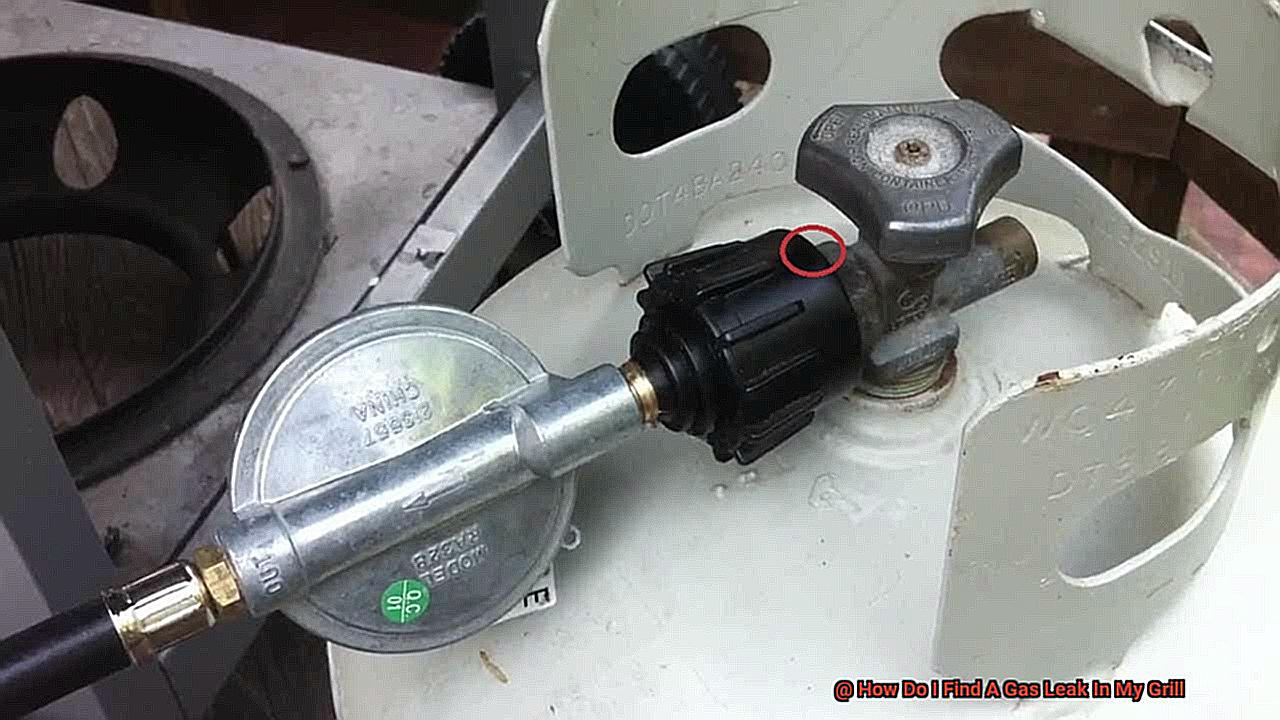
Regularly checking for gas leaks can also help extend the lifespan of your grill. Gas leaks can cause rust and corrosion to build up inside your grill, which can lead to more serious problems over time. By identifying and repairing leaks early on, you can prevent further damage and ensure your grill lasts for years to come.
Warning Signs
It’s imperative to be aware of warning signs such as the smell of gas, hissing sounds or bubbles forming in soapy water applied to fuel line connections. If you detect any of these signs or suspect there may be a gas leak in your grill, take immediate action by turning off its fuel source and giving it a thorough visual inspection for any cracks or holes.
Visual Inspection of Your Grill
Grill masters, it’s time to give your grill a thorough check-up. Conducting a visual inspection of your grill is the first crucial step in identifying any potential gas leaks and ensuring the safety of your family.
Let’s start with the gas hose and regulator. Look for any cracks or signs of wear that may cause gas to leak out. Check all fittings and connections between the gas tank and grill for any damage or leaks.
Moving on, inspect the burners and flame tamers. These parts are vital in regulating the flow of gas and heat distribution throughout your grill. Make sure they are clean and functioning properly to avoid any hot spots or uneven cooking.
Don’t forget to check the control knobs and valves for any signs of wear or damage. Test for leaks by applying a mixture of soap and water around these areas, looking for bubbles that indicate a gas leak.
Disconnecting the Propane Tank or Natural Gas Line
Grilling is one of the most enjoyable outdoor activities, but it’s important to stay vigilant when it comes to safety. If you suspect a gas leak in your grill, disconnecting the propane tank or natural gas line is the first step to resolving the issue. However, it’s crucial that you take the necessary precautions and follow proper procedure to avoid any accidents or injuries.
The first step is to turn off your grill and all burners, letting them cool down completely. This ensures that there are no hot surfaces that could ignite any gas that may have leaked out.
For propane grills, turn off the valve on the propane tank by turning it clockwise until it stops. Next, unscrew the hose from the propane tank by turning the coupling nut counterclockwise. For natural gas grills, turn off the gas supply valve attached to the gas line and use a wrench to loosen the connection between the gas line and the grill’s regulator.
Once you’ve disconnected the tank or line, it’s time to inspect your hoses and connections. Look for any signs of damage, such as cracks, holes, or fraying. Ensure that all connections are tight and secure. If you see any issues with your hoses or connections, replace them before using your grill again.
Now comes the exciting part – testing for leaks. Mix equal parts of dish soap and water in a spray bottle and apply it onto your hoses and connections. If you see bubbles forming, it indicates a gas leak. If this happens, turn off your gas supply immediately and have a professional inspect and repair your grill before using it again.
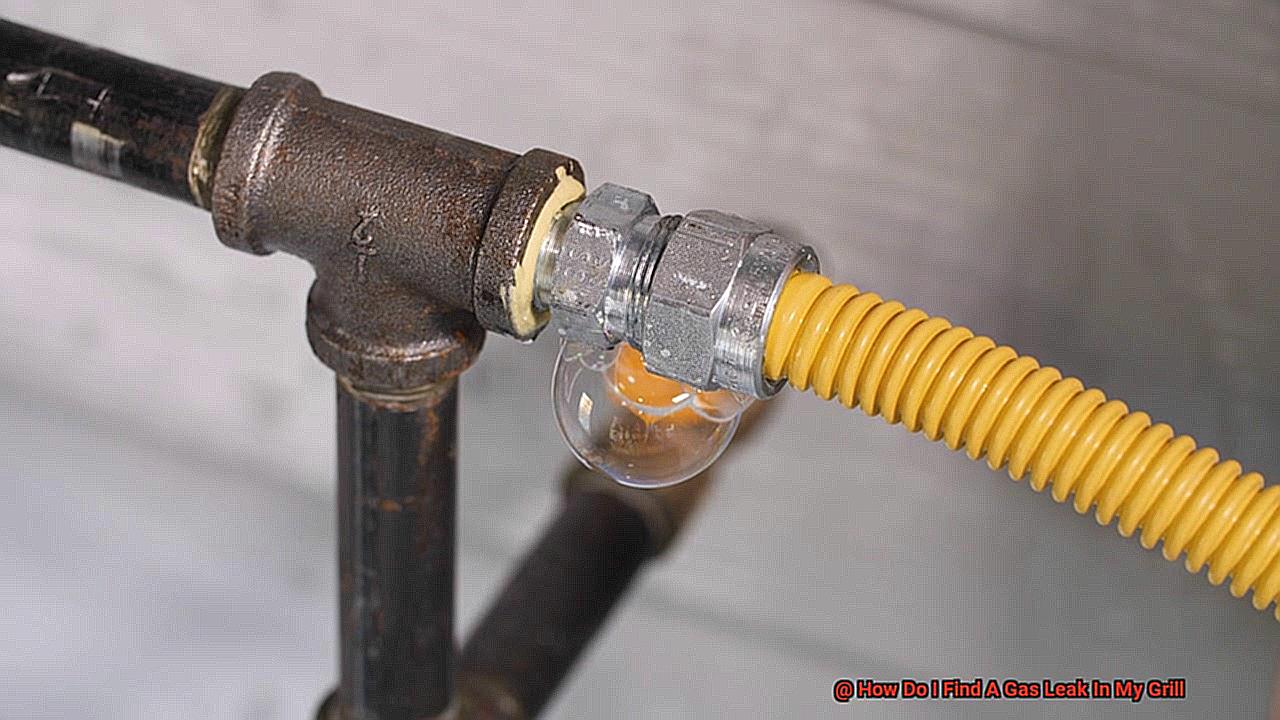
In summary, disconnecting your propane tank or natural gas line is an important step in maintaining safety while grilling. Always prioritize safety by following proper procedure and performing inspections regularly. Don’t forget to test for leaks with soap and water to ensure that your grill is safe to use.
Using Soapy Water to Check for Gas Leaks
Grilling is a treasured pastime for many, but ensuring safety is paramount. Gas leaks can pose a serious hazard, making it crucial to check for any potential leaks regularly. Fortunately, using soapy water to detect gas leaks is a simple and effective method that can be done by anyone, regardless of experience.
To begin, fill a spray bottle with a solution of soap and water at a ratio of 1:Turn on the gas supply to your grill, but refrain from igniting the burners. Spray the soapy solution onto all gas connections and hoses leading to the burners, ensuring thorough coverage.
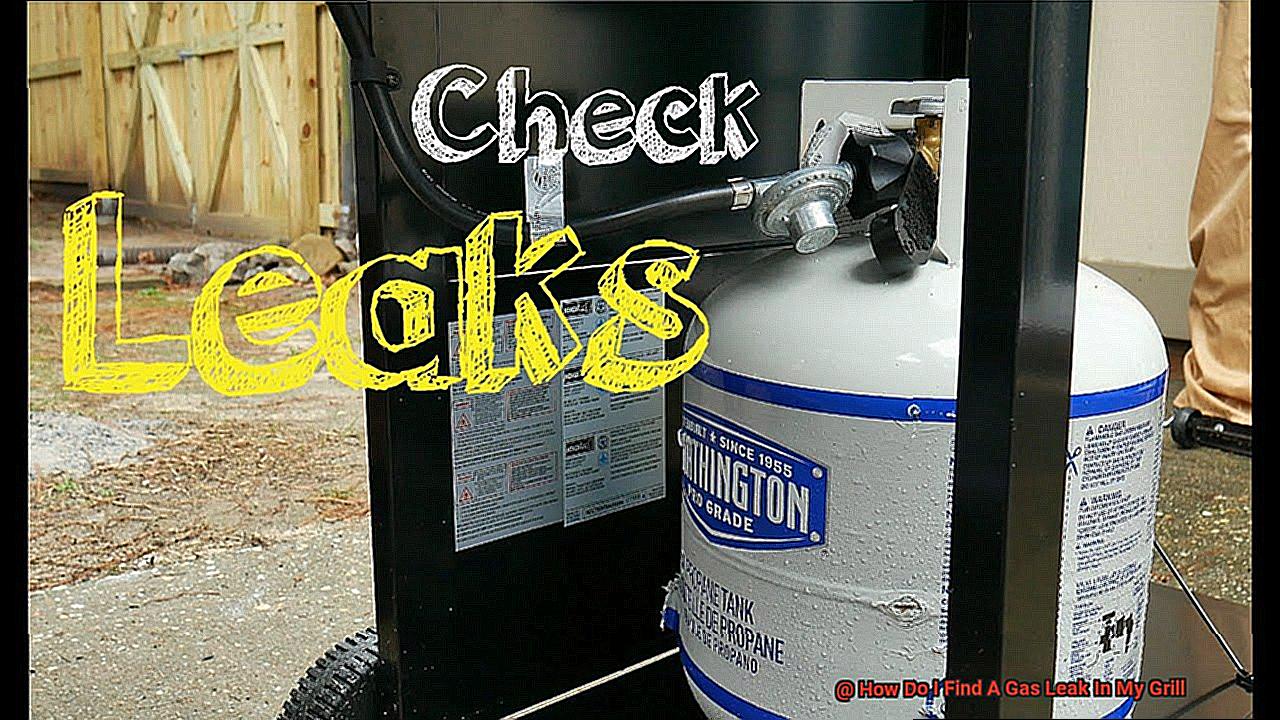
Keep a close eye on the connections and hoses for any bubbles that may form. If there is a gas leak, the soapy water will bubble up at the point of the leak. If you do notice bubbles forming, promptly turn off the gas supply and tighten any loose connections. Seek professional help if you are unsure about how to proceed or if you cannot stop the leak.
It’s essential to note that checking for gas leaks using soapy water should be done regularly as part of routine safety checks and maintenance for your grill. By taking this simple step, you can ensure that your grill is always safe to use, free from potential hazards.
Fixing Any Leaks Before Using Your Grill
One crucial step to take before you start cooking is to check for gas leaks. Gas leaks can be dangerous and can cause fires or explosions, so it’s essential to take the time to ensure that your grill is safe to use. Here are some steps to follow to help you find and fix any leaks before using your grill.
Firstly, turn off the gas supply to your grill by turning the valve on the propane tank clockwise until it is tight. This simple step will prevent any gas from flowing through the grill while you check for leaks. Next, grab a brush and some soapy water and start brushing it onto all gas connections, including the regulator, hoses, and valves. Keep a close eye out for any bubbles forming – this is an indication of a gas leak.
It’s important to note that even small bubbles should not be ignored, as they can still lead to potential hazards. If you do find any leaks, try tightening the connections or replacing damaged parts. If you’re unsure how to repair the leak, it’s best to consult a professional. A qualified technician can help you identify any potential issues and provide guidance on how to fix them.
Remember that your sense of smell can also be an indicator of a gas leak. If you notice a strong gas smell but don’t see any bubbles forming, turn off the gas supply immediately and seek professional help.
In conclusion, it’s critical to take the time to check for gas leaks before using your grill. By following these simple steps and fixing any leaks promptly, you can enjoy grilling with peace of mind. Here are some additional tips to keep in mind:
- Regularly inspect your grill for signs of wear and tear, including rusted or damaged components.
- Keep your grill clean by removing grease buildup and debris after each use.
- Store your propane tank in a cool, dry place away from direct sunlight and high temperatures.
Using a Gas Leak Detector
As a grill master, you know there’s nothing quite like the taste of perfectly grilled meat. But before you fire up your grill, it’s crucial to ensure that there are no gas leaks that could lead to hazardous incidents. Fortunately, using a gas leak detector is one of the most effective ways to detect a gas leak in your grill.
Using a gas leak detector is easy and straightforward. Here’s what you need to do:
Step 1: Turn off the gas supply and all burners
Before using your gas leak detector, turn off the gas supply and all burners on your grill. This step ensures that you don’t accidentally ignite any gas while using the detector.
Step 2: Turn on the gas leak detector
Next, turn on your gas leak detector and hold it close to your grill’s gas line and connections. To ensure accuracy, move the detector slowly around the area, including the regulator, hoses, and connections.
Step 3: Listen for an alarm or warning sound
If there is a leak, the detector will emit an alarm or warning sound. When this happens, immediately turn off the gas supply and fix the leak before using your grill again.
It’s worth noting that gas leak detectors have different sensitivities. Therefore, choose one that’s suitable for detecting gas leaks from your grill. Additionally, if you’re ever unsure about fixing a gas leak yourself, seek professional help.
Checking for Gas Leaks Regularly
But before you do, ensure that your grill is safe and free from gas leaks. Gas leaks are serious safety hazards that can lead to fires or explosions. Therefore, it’s essential to check for them regularly.
One way to perform a gas leak test is the soapy water test. This test is easy to perform and requires a few household items. Mix dish soap with water in a spray bottle, turn off the gas supply, and disconnect the propane tank from your grill. Next, turn on the burners and brush the soapy water solution onto the hoses that connect the propane tank to the grill and the regulator. If you see bubbles forming, this indicates a gas leak. In this case, turn off the grill immediately and tighten any loose connections. If tightening doesn’t work, replace any damaged hoses or fittings.
Another way to check for gas leaks is to use a gas leak detector, which can be purchased at hardware stores and is easy to use. Turn on your grill and hold the detector near the hoses and connections. If there is a leak, the detector will emit an audible alarm or flash a light.
It’s important to note that regularly checking your grill for gas leaks is crucial even if you don’t suspect one. This can help identify potential issues before they become serious safety hazards. Therefore, make sure to check your grill regularly.
7bYLWnNIwsQ” >
Conclusion
In summation, grilling is a cherished pastime that brings people together, but it’s crucial to prioritize safety when using a gas grill. Gas leaks can pose a serious threat if they go unnoticed or untreated. Therefore, it’s essential to know how to detect and fix any gas leaks that may occur.
Prevention is key, so always turn off the gas supply and check for leaks before firing up your grill. If you suspect a gas leak during a cookout, remain calm and act quickly. Be on the lookout for warning signs like hissing sounds, the smell of gas or bubbles forming where the gas is escaping.
Performing regular visual inspections of your grill can help identify potential issues before they become hazardous. Use soapy water to check for gas leaks by spraying it onto all connections and hoses leading to the burners and looking for bubbles that may form.
Disconnecting your propane tank or natural gas line when not in use is an important step in maintaining safety while grilling. Always prioritize safety by following proper procedures and performing inspections regularly.
Using a gas leak detector is another effective way to detect gas leaks in your grill. It’s crucial to check for gas leaks regularly even if you don’t suspect one to identify potential issues before they become significant hazards.
By taking these steps, you can ensure that your grill is safe to use and enjoy worry-free outdoor cooking with family and friends.

